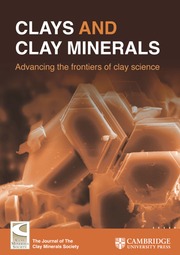Crossref Citations
This article has been cited by the following publications. This list is generated based on data provided by
Crossref.
Cerpa, A.
García-González, M. T.
Tartaj, P.
Requena, J.
Garcell, L.
and
Serna, C. J.
1999.
Mineral-Content and Particle-Size Effects on the Colloidal Properties of Concentrated Lateritic Suspensions.
Clays and Clay Minerals,
Vol. 47,
Issue. 4,
p.
515.
Ma, Kunsong
and
Pierre, Alain C.
1999.
Clay Sediment-Structure Formation in Aqueous Kaolinite Suspensions.
Clays and Clay Minerals,
Vol. 47,
Issue. 4,
p.
522.
Ambikadevi, V.R
and
Lalithambika, M
2000.
Effect of organic acids on ferric iron removal from iron-stained kaolinite.
Applied Clay Science,
Vol. 16,
Issue. 3-4,
p.
133.
Agarwal, M
Rai, K
Shrivastav, R
and
Dass, S
2003.
Deflouridation of water using amended clay.
Journal of Cleaner Production,
Vol. 11,
Issue. 4,
p.
439.
Chen, Liang
Chen, Dong‐Hui
and
Wu, Chong‐Liang
2003.
Studying flocculation mechanism of chitosan with pyrene‐fluorescence probe method.
Chinese Journal of Chemistry,
Vol. 21,
Issue. 9,
p.
1224.
Guerin, Marianne
Seaman, John C.
Lehmann, Charlotte
and
Jurgenson, Arthur
2004.
Acoustic and Electroacoustic Characterization of Variable-Charge Mineral Suspensions.
Clays and Clay Minerals,
Vol. 52,
Issue. 2,
p.
158.
Kaya, Abidin
Ören, Ali Hakan
and
Yükselen, Yeliz
2006.
Settling of Kaolinite in Different Aqueous Environment.
Marine Georesources & Geotechnology,
Vol. 24,
Issue. 3,
p.
203.
Sadek, Olfat M.
Mekhemer, Wafaa K.
Assaad, Faiz F.
and
Mostafa, Bassem A.
2006.
Electrokinetic potential of kaolinite clay in the presence of polystyrene sulfonate.
Journal of Applied Polymer Science,
Vol. 100,
Issue. 3,
p.
1705.
Mekhamer, W.K.
Al Andis, N.
and
El Shabanat, M.
2009.
Kinetic study on the sedimentation behavior of Na- and Ca-kaolinite suspension in the presence of polyethyleneimine.
Journal of King Saud University - Science,
Vol. 21,
Issue. 2,
p.
125.
Kwon, Hye Mi
Hur, Won
and
Lee, Shin Young
2014.
An In Situ Quality Estimation of Raw Aloe vera Gel by Using the Flocculation Property of Bentonite Suspension.
Food Engineering Progress,
Vol. 18,
Issue. 2,
p.
146.
Nagappan, Saravanan
Ha, Hyung Min
Park, Sung Soo
Jo, Nam-Ju
and
Ha, Chang-Sik
2017.
One-pot synthesis of multi-functional magnetite–polysilsesquioxane hybrid nanoparticles for the selective Fe3+ and some heavy metal ions adsorption.
RSC Advances,
Vol. 7,
Issue. 31,
p.
19106.
Grilo, C.F.
Quaresma, V. da S.
Amorim, G.F.L.
and
Bastos, A.C.
2018.
Changes in flocculation patterns of cohesive sediments after an iron ore mining dam failure.
Marine Geology,
Vol. 400,
Issue. ,
p.
1.
Gangadhara Reddy, N.
and
Hanumantha Rao, B.
2018.
Characterization of Settled Particles of the Red Mud Waste Exposed to Different Aqueous Environmental Conditions.
Indian Geotechnical Journal,
Vol. 48,
Issue. 3,
p.
405.
Grilo, C.F.
Chassagne, C.
Quaresma, V. da S.
van Kan, P.J.M.
and
Bastos, A.C.
2020.
The role of charge reversal of iron ore tailing sludge on the flocculation tendency of sediments in marine environment.
Applied Geochemistry,
Vol. 117,
Issue. ,
p.
104606.
Tchameni, Alain Pierre
Xie, Binqiang
Ma, Jiang
Wang, Yun
Zhao, Lin
Xie, Longlong
Luo, Mingwang
and
Wen, Jiantai
2021.
Thermo-associating copolymer based on cross-Linked 2-acrylamido-methylpropane sulfonic acid, part C: Experimental study into the performance of deepwater aqueous drilling fluids.
Colloids and Surfaces A: Physicochemical and Engineering Aspects,
Vol. 612,
Issue. ,
p.
125965.
Liu, Hongchang
Yuan, Peng
Liu, Dong
Zhang, Weiwei
Tian, Qian
Bu, Hongling
Wei, Yanfu
Xia, Jinlan
Wang, Yinchu
and
Zhou, Junming
2021.
Insight into cyanobacterial preservation in shallow marine environments from experimental simulation of cyanobacteria-clay co-aggregation.
Chemical Geology,
Vol. 577,
Issue. ,
p.
120285.
Boshrouyeh Ghandashtani, Mohammad
Costine, Allan
Edraki, Mansour
and
Baumgartl, Thomas
2022.
The impacts of high salinity and polymer properties on dewatering and structural characteristics of flocculated high-solids tailings.
Journal of Cleaner Production,
Vol. 342,
Issue. ,
p.
130726.
Abdmoulana, El Hassen
and
Ören, A. Hakan
2025.
Performance Evaluation of Final Sediment Volume Over Swell Index in Terms of Liquid Limit and Hydraulic Conductivity.
International Journal of Civil Engineering,
Vol. 23,
Issue. 4,
p.
737.


